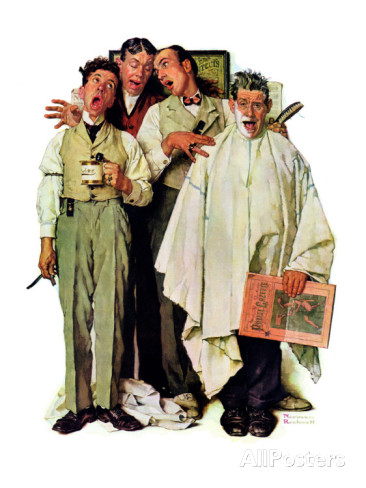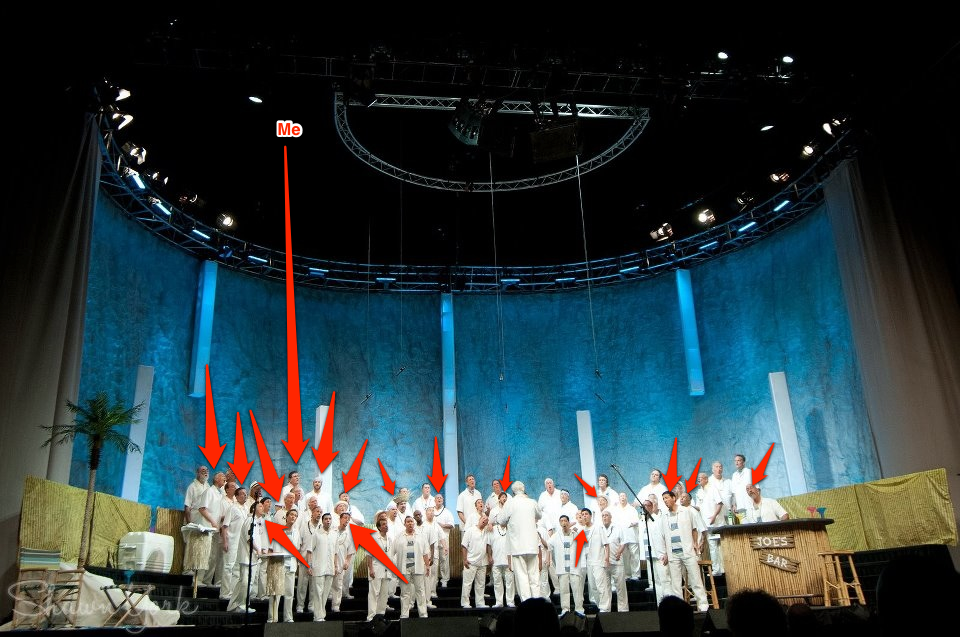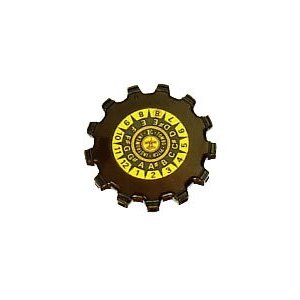How Barbershop Harmony Has Helped My Career in Tech
Update, April 11, 2013: Happy Barbershop Quartet Day and 75th anniversary of the Barbershop Harmony Society! It all started 75 years ago today on a rooftop in Tulsa, Oklahoma.
I’m a software engineer. I’m also completely addicted to an incredible hobby: barbershop. I’ve been reflecting lately on the impact of this thing I’ve grown to be so passionate about over a very short amount of time on the development of my career, and I’ve realized it’s been pivotal for me. It’s kept me grounded, built my network, given me a reason to build cool things, helped me find the confidence and courage to do things I never thought I’d do, and been a huge amount of fun in the process. I wanted to share a bit about why I’m so excited about it, and why it (or any other hobby) might hold some similar value for other aspiring engineers.
Cutting hair
At this point, you might be asking, “What’s Barbershop?” I’ve had people legitimately ask me whether I cut peoples’ hair, and it always makes me chuckle.
 Barbershop!
Barbershop!
Barbershop is an American a cappella musical style characterized by four-part, tight harmonies with a primarily homophonic (all parts singing the same words at the same time) texture. Not everybody knows what a barbershop quartet is off-hand, but most people have been exposed to it in some form or another. Some pop-culture examples:
- The traditionalists out there probably first encountered barbershop in the 1962 film, The Music Man
- Homer’s quartet on The Simpsons – “The Be Sharps”
- Family Guy occasionally has a quartet on to teach some important (and often quite dirty) medical lesson
- Real-life a cappella group “The Blanks” that appeared on Scrubs as “Ted’s Band” or “The Worthless Peons” (not strictly barbershop, but they made use of the style now and then)
- Jimmy Fallon’s fusion quartet, “The Ragtime Gals”
All of this helps perpetuate a stereotype of Barbershop as a group of middle-aged fogeys dressed in brightly-colored, striped suits, wearing boaters and garters and a big moustache. But modern barbershop is a stunning and thrilling sport, culminating yearly in the world’s largest a cappella competition – an exhibition of the world’s greatest barbershop quartets and choruses. Some of my favorite recent winners:
- OC Times
- Max Q
- Vocal Spectrum
- The Ambassadors of Harmony
- More great stuff can be found in this awesome documentary (available on DVD and Netflix): American Harmony
Barbershop’s got a heavy dose of schmaltz and the thrill of ringing a chord that just can’t be beat in my book, which is why I feel so lucky to have made it a part of my life.
The Community
I grew up with barbershop in the household. My father had a quartet that rehearsed weekly at our house in Southern California, and I have fond memories of listening to them rehearse and seeing them perform. I never really got into it, though – my sister was the singer in the family, and my focus was always on academics. It wasn’t until after I had finished my education in Computer Science at UC Berkeley that I began to explore an interest in barbershop.
When I first moved to the Seattle area to work for Microsoft after university, I didn’t really know anyone in the area, and was searching for a way to establish a social circle and make friends. My dad suggested that I check out the local chapter of the Barbershop Harmony Society, Northwest Sound. I sent them an email, visited a rehearsal, and was instantly hooked. I remember vividly one of of the members of the chorus walking over to me and saying “would you stop smiling so much!”
Within 6 months, I’d auditioned and become a member of the chorus and participated in my first International Barbershop Chorus Contest and convention in Anaheim:
By joining the chorus, I’d been warmly welcomed into a community – one that would mean more to me than I realized at the time. It became an important part of my social circle. When my grandfather passed away, they were there to support me. As I got settled into my new career, it helped provide me with a life outside of work where I could foster both my own individuality and new friendships.
Every convention I attended (whether local, regional, or international) was a reminder of this huge community I had become a part of. Almost anywhere in the country that I might go, I could count on there being a group there to welcome me with open arms. Part of the beauty of Barbershop and being a part of the Barbershop Harmony Society is that it’s a group of amateurs (a huge portion of the members can’t even read music!) all sharing a common interest while producing great music. It’s a hobby that’s accessible to everyone from all walks of life – not just singers – which means there are always new people to meet and new experiences to share.
My quartet-mates and chorus-mates have become some of my closest friends – there to support me through thick and thin – and not just when it comes to singing.
The Network
Singing with Northwest Sound and the Northwest Vocal Project in Seattle was immensely fun and provided some great social experiences, but it also turned out to open up a number of other opportunities. Being so close to Microsoft’s main campus meant I got to know people from all around the company working on a wide variety of products. Some were new to the company – others had been there for 15 or 20 years, and knew all of the ins and outs. Whenever I had a career-related question, I knew who to go to for advice. And the chorus was chock full of people from all sorts of disciplines – the tech folks from Microsoft and Amazon, lawyers, doctors, teachers, construction workers, you name it. I even took one of my chorus-mates as my new dentist!
When I moved back to Silicon Valley, one of the first things I did was find a local chapter to join. There, I found Voices in Harmony, and incredible group that rehearses weekly in San Jose. I got far more than I bargained for with this group. It’s a veritable who’s who of Silicon Valley. I was still at Microsoft at the time, but my chorus-mates worked as engineers at Microsoft, Google, NVIDIA, HP, Intel, Salesforce, TIBCO, and a dozen other local tech companies. There are entrepreneurs and investors, lawyers and accountants. It’s not a free ticket to anything, but it’s certainly a ripe place for developing personal relationships with people across the industry.
 Tons of people in tech. There are certainly many more that I didn’t point out, but as you can see the density is quite high!
Tons of people in tech. There are certainly many more that I didn’t point out, but as you can see the density is quite high!
Last year, we performed at the Intersection event, held at Pixar, since the event was run by one of our members. As part of the performance, we delivered an emotional tribute to Steve Jobs, singing “I Will Go Sailing No More” from Toy Story for the likes of Ed Catmull (President of Pixar) and Tim Brown (CEO of IDEO). This is a connected and savvy crowd.
As I moved on from Microsoft to Google, and then finally to the startup I’ve been so excited to be involved with in the last year, Parse, this network would prove invaluable. I received fantastic counsel from my friends in the chorus, and made some of the best career-related decisions of my life. Perhaps the best advice I got was to jump from the cozy comfort of Google into the startup world. Were it not for the encouragement of my chorus-mates, I might have continued to wait – to hem and haw rather than pulling the trigger – and I would definitely be regretting it.
The Experiences
Barbershop has helped me grow in ways that have directly translated to the work I’ve done.
First, as cliche as it may sound, it helped me find my voice. There is a dichotomy in Barbershop of quartet singing (where you are solely responsible for your own voice part) and chorus singing (where you are a member of a section, all singing the same voice part and contributing to a unit sound). In either case, however, you have to work to produce harmony, reinforcing the other parts as you go. Sing without confidence, and there’s nothing for the other people in your section or quartet to latch onto – you force them to come to you instead of adding to the sound. Sing so loudly that you blast the other parts away, and you pierce through the fabric of the sound – actually detracting from the performance even though you have added volume. The lesson: move confidently, but listen, and reinforce and complement the strengths of your team.
Less metaphorically, Barbershop has given me a huge amount of experience with public performances. It’s hard to get too worked up about speaking for a room full of developers after you’ve started to get comfortable singing with a quartet for an audience of hundreds of people, singing with a chorus in a stadium full of thousands, or performing in front of some of your musical heroes. I’ve learned a lot about finding ways to calm myself before performing, owning the stage, and even enjoying the experience. It’s a skill I’ve used frequently – whether at Microsoft, at a local user group, or with my coworkers. There’s still a lot that I can do to hone this ability, but I value the opportunities I’ve had to practice thanks to my barbershopping habit.
The hobby has also stoked a competitive fire in me. I don’t take part in barbershop competitions looking to win (I’m not nearly good enough), but each contest is an opportunity to test myself – to mark my progress and improvement. I’m intent on getting better; I’m constantly trying to push myself and find ways to help my team/quartet/chorus perform at ever-higher levels. I may not always succeed – I have plenty of deficiencies to overcome – but this all keeps me energized to do more. I find myself using my work to reinforce my singing, and vice versa. When I’m feeling a slump in one, I can always count on the other to get me going again.
 My quartet, taken just before going on stage to compete.
My quartet, taken just before going on stage to compete.
The Projects (a.k.a. C♯… a.k.a. D♭)
Some of the most rewarding work I’ve done has been steeped in my barbershop fixation. I have found a lot of joy in crossing my passion for barbershop with my passion for technology – in ways that have had concrete impacts on my career.
My first foray into the barber-tech world occurred while I was still with Microsoft in Seattle working on the Silverlight team. The chorus’s music leadership needed a way for members to submit self-evaluations of recordings of themselves, after which the music team would provide feedback and suggestions for ways to improve. I decided to build a Silverlight application in my spare time to address the problem. It wasn’t a sophisticated application, but it resulted in a number of suggestions and bug reports that could be driven back into the product I was working on. It also gave me significantly more empathy for Silverlight developers and the experience they would have working with the product. I was able to use that empathy to advocate for developers and more effectively prioritize our work.
Near the end of my time at Microsoft, I started experimenting with mobile app development for Windows Phone 7. After all, it was on a platform I was already deeply familiar with, and I knew it would give me some insight into a new realm of development. I chose as my first apps a digital pitch pipe (used by singers to help them find the starting key of a song) and an app for accessing an online database of barbershop tags (short snippets of barbershop songs that can be learned and taught quickly, by ear – a common pastime for barbershoppers). Before starting at Google, I reimplemented both apps for Android, and eventually built the pitch pipe app for iOS as well.
 A Tombo pitch pipe.
A Tombo pitch pipe.
The apps (Pitch Perfect and Tag Master), both free, were far more successful than I had ever anticipated. I built them to support my hobby, and hoped a few people would find them useful. Since launch, however, Pitch Perfect has been downloaded over 200,000 times, and Tag Master has been downloaded about 12,000 times (which, when you consider that the app is only for barbershoppers and the barbershop harmony society only has about 25,000 members, is pretty impressive). Not bad for a personal project done in my spare time!
More important than the success of the apps, however, is that building them opened up the world of mobile app development for me. It was while working on these apps that I happened upon Parse, and having considered (and rejected) building a custom backend to support my apps, realized that Parse was doing something spectacular. There were only 5 people on their team page at the time, and I knew immediately that I had to get involved. I applied by API, and took my first step into the world of startups. I can’t speak for the guys who interviewed me, but I highly suspect that my having built and shipped apps on multiple mobile platforms was an important part of what made me an intriguing candidate, and I know it’s given me insights I wouldn’t otherwise have into mobile app development. I couldn’t be happier to be working at Parse today, building an amazing product that makes mobile application development orders of magnitude easier, and barbershop was a big part of getting me there.
Giving Back
For me, barbershop has also been an outlet for volunteerism and charity. The Society (and its charitable arm, the Harmony Foundation) works to preserve this art form, but also contributes to music education across the country.
I’ve tried to do my part to give back. Beyond just donating, my quartet and I have volunteered our time working for an annual youth harmony camp in Pollock Pines, California. Last year, I, along with the rest of my quartet and some other friends from my chorus, put together a youth chorus in the Bay Area to take to an international youth chorus festival in Tucson, Arizona. We built the organization from the ground, up, while introducing a new generation to barbershop music.
This was valuable both because of its charitable nature and because of the experience it gave me building and organizing a group of 20-odd people. It’s not a skill I’m using yet in my professional life, but I do one day hope to be involved with growing an organization, and I think this experience will prove to be useful.
The Tag
Barbershop continues to be an important part of my life, and I’m still learning new lessons that apply both to the musical world and to my career. I’m still very young and have a lot to master – in both the world of barbershop and the world of high technology.
What’s clear to me, though, is that barbershop has been a major net positive in my life and my career. Beyond just the joy of the hobby, it has provided a community, a network, inspiration for projects, and vast opportunities to learn and grow. Perhaps it’s not for everybody (although I encourage everyone who’s even got the slightest inclination to give it a try!), but I do think there is value for everybody in finding a hobby – a passion – that can broaden your horizons. Find ways to make it work for you and your career, and pursue it knowing that its value is manifold.
I’m not nearly old or wise enough to preach, but I wanted to share what has worked for me. I’m excited to keep following this path, and hope others find similar inspiration!
I’ll leave you with a video of my quartet, First Strike, at our most recent competition. We’ve come a long way since we first started singing together a few years ago, and still have a huge amount of room to improve. Don’t forget, I’m an amateur, so be gentle!
P.S. If you’re interested in learning more about how to get involved with Barbershop (or if you’re looking for a quartet to sing at an engagement ;)), please contact me!